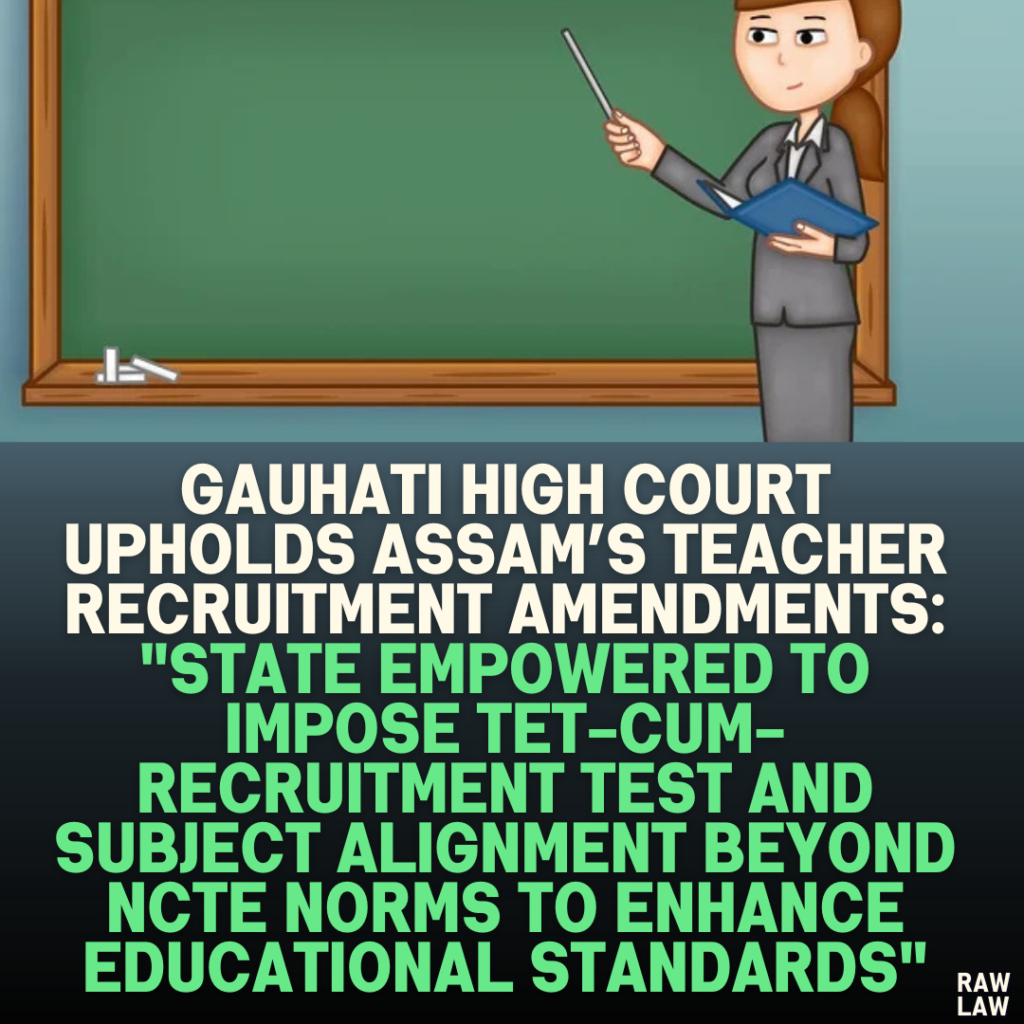Court’s Decision:
The Gauhati High Court validated the Assam Secondary Education (Provincialised Schools) Service (Amendment) Rules, 2023, and the Second Amendment Rules of 2023. It ruled that the Assam Government was within its rights to introduce additional qualifications, such as the TET-cum-Recruitment Test, and specific subject alignment requirements for teachers. The court emphasized that these qualifications do not dilute the minimum standards set by the National Council for Teacher Education (NCTE) Regulations, 2014.
Facts:
- The petitioners, qualified under the existing Teacher Eligibility Test (TET) framework, challenged the amendments introduced by the Assam Government.
- The amendments:
- Introduced the TET-cum-Recruitment Test as a qualification criterion.
- Mandated that Post Graduate Teachers must have studied the same subject at both graduate and postgraduate levels.
- Modified the rules for awarding bonus marks to candidates with experience.
- Petitioners argued that these amendments placed undue burdens on them and created additional barriers to recruitment.
Issues:
The court addressed two main issues:
- Competence of the State: Whether the Assam Government has the legal authority to prescribe additional qualifications such as the TET-cum-Recruitment Test and subject alignment requirements, given the NCTE Regulations, 2014.
- Conflict with Central Law: Whether the amendments conflict with or are repugnant to the NCTE Act, 1993, and the NCTE Regulations, 2014.
Petitioners’ Arguments:
- Conflict with NCTE Regulations:
- The NCTE Act and its 2014 Regulations set minimum qualifications for teachers, and the Assam Government’s amendments go beyond these norms.
- The NCTE Regulations do not require a TET-cum-Recruitment Test or subject alignment.
- The amendments contradict central laws and should be struck down under Article 254(2) of the Constitution.
- Arbitrariness of Amendments:
- The amendments requiring alignment between graduate and postgraduate subjects are irrational and arbitrary.
- TET-qualified candidates are being forced to retake tests (TET-cum-Recruitment Test), even though their qualifications were deemed valid for life.
- Discrimination:
- The amendments create unjustified classifications among candidates, violating principles of equality.
Respondents’ Arguments:
- State’s Legislative Competence:
- The NCTE Regulations only set minimum qualifications. The State has the discretion to prescribe higher standards or additional qualifications to meet local needs.
- Public Interest and Educational Standards:
- The TET-cum-Recruitment Test ensures a uniform standard of assessment.
- Aligning graduate and postgraduate subjects ensures teachers have a strong foundational understanding, which is critical for effective teaching.
- These measures aim to enhance the quality of education and are aligned with public interest.
- Administrative Necessity:
- The State introduced the TET-cum-Recruitment Test due to difficulties in conducting the standard TET exams over the past three years. This new test streamlines the recruitment process while maintaining fairness.
Analysis of the Law:
- The NCTE Act, 1993:
- This central law established the NCTE, tasked with setting minimum standards for teacher education across India.
- The court noted that the NCTE’s 2014 Regulations set minimum qualifications but do not restrict states from prescribing additional qualifications.
- Constitutional Provisions (Article 254):
- Article 254 addresses conflicts between central and state laws on concurrent subjects.
- The court found no repugnancy between the Assam amendments and the NCTE Regulations, as the amendments supplement the NCTE norms without diluting them.
- Judicial Precedents:
- The court cited rulings, including Dr. Preeti Srivastava v. State of M.P., where it was held that states can prescribe higher qualifications than those set by central regulations.
- It concluded that Assam’s amendments were consistent with this principle.
Precedent Analysis:
The court referred to several cases, including:
- S. Satyapal Reddy v. Government of A.P.: Affirmed states’ power to impose higher qualifications.
- Jaiveer Singh v. State of Uttarakhand: Emphasized the necessity of subject-specific expertise for teachers.
- Manish Kumar v. Union of India: Highlighted that laws must serve public interest and avoid arbitrariness.
Court’s Reasoning:
- No Repugnancy: The court held that the amendments do not conflict with the NCTE Regulations as they maintain minimum qualifications while introducing higher standards.
- Public Interest: Subject alignment and the TET-cum-Recruitment Test aim to ensure teachers are well-qualified and equipped to teach effectively, particularly in secondary schools.
- Educational Quality: The court stressed that requiring alignment between graduate and postgraduate subjects enhances conceptual clarity and teaching effectiveness, benefiting students.
Conclusion:
The court dismissed the petition, ruling that:
- The Assam Government acted within its competence by introducing the amendments.
- The amendments are rational, non-discriminatory, and aligned with public interest.
Implications:
- For the State: The decision reinforces states’ authority to introduce higher qualifications for teacher recruitment.
- For Candidates: Aspirants must now meet stricter criteria, including the TET-cum-Recruitment Test and subject alignment requirements.
- For Education: The judgment underscores the importance of enhancing teacher quality to improve educational outcomes.
